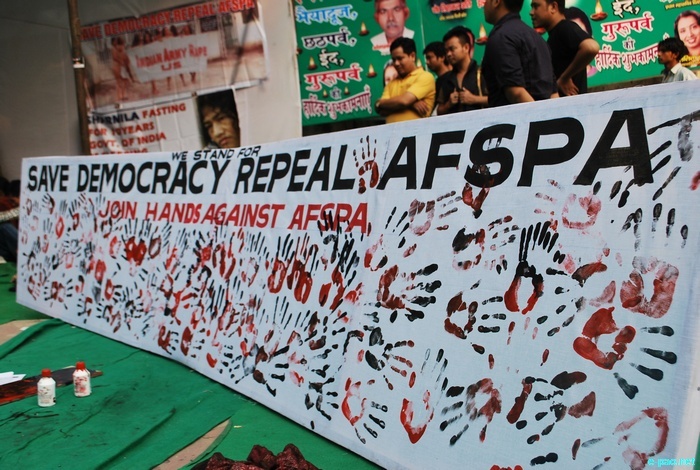TRIPURA DISPENSES WITH AFSPA IN LANDMARK DECISION, JAMMU AND KASHMIR CONFUSED AND LOST
There have been various protests across the country to repeal AFSPA;

NEW DELHI: In a landmark development, the Tripura government on Wednesday repealed the controversial Armed Forces Special Powers Act (AFSPA) by lifting the Disturbed Areas Act from the state.
Tripura Chief Minister Manik Sarkar told The Citizen from Agartala that the decision had been taken in a Cabinet meeting, and had been on the cards for a while. He said the meeting was unanimous that the state was no more a ‘disturbed area’’ as insurgency has dwindled to a trickle in Tripura.
“ Since the ‘disturbed area’ status has been lifted, AFSPA gets automatically repealed. AFSPA gets operative in a state only when an area has been declared as ‘disturbed’, he explained.
Sarkar said that the revocation of the Disturbed Areas Act came under the jurisdiction of the state. He said, “we have declared it ourselves. Decision was our own. We have witnessed that insurgency has almost declined in the state and there is no need to continue with the ‘disturbed area’ status. We shall keep the Home Ministry updated about it. But the Centre had no role to play”.
Sarkar added that as per the provision of the Disturbed Area Act, every six months the government has to review whether there is a necessity to continue with the Act. “ We reviewed the current law and order situation, consulted the police and security forces and it was unanimously decided that there was no need to continue with it”, he said.
On being asked why other states like Arunachal Pradesh, who has been urging the Centre to revoke AFSPA, haven’t done it themselves, Sarkar said “Both the Centre as well as the State can lift the disturbed area tag. I am not too sure about them. But in Tripura, we decided it ourselves.”
The controversial AFSPA was promulgated in Tripura on February 16, 1997 due to the increasing problems of insurgency in the state, which resulted in relentless violence and bloodshed. This was the same year when the Farooq Abdullah government allowed the Disturbed Areas Act to lapse in Jammu and Kashmir. And from then on the jurisdiction of declaring an area in the state to be Disturbed under the Act passed from the state to the centre, with the Governor using what the Army insists is an enabling clause in the Armed Forces Special Powers Act to tag an area as ‘disturbed.’
The Citizen spoke to different persons in Jammu and Kashmir to ascertain the exact legal status, and found that even senior politicians were vague about the legal position in force since 1997. A top ranking retired Army official insisted that the Disturbed Areas Act that gave powers to the state alone should not be “confused” with the enabling clause in AFSPA that allowed the Governor to take the decision to impose AFSPA in an area declared ‘disturbed’. Senior politicians and lawyers insisted that this was the ‘grey area’ created by the Abdullah government’s decision to allow the Act to lapse, and thereby ensure that the powers “somehow” passed to the centre.
A senior lawyer said that legally there could be no disturbed area without the Disturbed Areas Act, but it was clear from all the responses that there is a great deal of confusion even amongst the law makers and law implementers in Jammu and Kashmir on this issue. The only categorical voice came from the Army that insisted that the powers to dub an area in Jammu and Kashmir ‘disturbed’ lay solely with the Centre though a provision in AFSPA itself.
Pabitra Kar, an MLA of Khayerpur constituency of Tripura hailed the Cabinet decision to revoke the Act.
“When insurgency was in full swing,the Act came into being in the state. But after 2003, the insurgency problem has decreased to a great extent. All the areas are very peaceful. After observing this, consulting the police and paramilitary forces who all suggested to withdraw the Act, we have done so. The inputs were very positive. Only two-three areas near the Bangladesh border are a bit disturbed so to say, but the state police can tackle it. Why need a special law for it?”, Kar told The Citizen.
The law was implemented in two-third of the total police station areas in Tripura initially but gradually was extended to other areas we well. Presently, AFSPA was fully operational in 26 police stations areas and partially in four police station areas out of the total 74 police stations and 36 out posts of Tripura.
The repealing of the Act also means that the traffic would now be allowed to move on the Assam-Agartala National Highway till midnight.
The Armed Forces Special Powers Act has been under severe criticism to the extent of being called “draconian” owing to the freehand and sweeping powers it gives to the Army and the human rights violations it has lead to. The army is empowered to shoot at sight, keep suspects in custody without trial and make arrests without any warrant, as per the provisions of this Act.
Tripura’s decision is bound to generate a debate and renewed pressure on both state and central governments in the N-E and Jammu and Kashmir.

